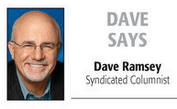Coffee with Mimi: Queuing up for life
Published 9:06 am Monday, May 22, 2017
By Mimi Becker
Contributing writer
Many years ago I was fortunate to spend several weeks in a quaint English village just a short train ride from London. The trip was not really a tourist visit as I was staying with relatives and therefore able to immerse myself in the daily life of a family. Some events were out of the ordinary. We went to a cookout at the local cricket club, attended a fundraiser at the home of Lord and Lady Pilkington and made regular trips into London for sightseeing and shopping. Perhaps, someday I will recount the story of the fundraiser. It was a memorable experience straight out of a BBC show.
Some of my memories are of the spectacular moments; Buckingham Palace Changing of the Guard up close, the Crown Jewels, Harrods, the Pilkington event. Other memories are of more common place daily life; British grocery shopping, odd phrases, gardening.
One such apparently common practice in many situations was queueing. Queuing means lining up. The fact that I was struck by the “rules” may mean more about Americans than it does about the British. The British utilize the technique for orderly and fair progression through many of life’s daily situations.
For example, when riding an escalator into or out of the Underground, one queues right. If you are going to stand still, you line up on the right side of the escalator. This behavior is to allow for those who want to/need to walk on the escalator breaking some sort of escalator speed record while not mowing down average, ordinary riders, the space to do so on the left of the moving stairs.
When visiting the bank , customers wait in a single line and progress to the next available teller in order. This practice was my favorite. It seems the rule in my life is that no matter which line I get in, it is always the longest one. The theory holds true even if there is no one in the line when I get in it. It is also true in other arenas, as well; the ball park concessions stand, the toll booth on the highway, the grocery store.
While doing graduate study many years after my introduction to queuing, I learned there is real theory behind orderly lines. There are actual mathematical calculations which, in theory, when applied correctly in specific situations, determine exactly how the system should work. The calculations allow management to staff exactly the most efficient number of attendants, at exactly the right locations at exactly the right time to keep customers happy and the cash registers ringing at the most optimal rate every minute the operation is open.
Therein lies the fallacy of mathematical theory. You see, the calculations fail to account for the human element. They do not take into consideration that someone in line in front of you did not remember to get the tuna or toilet paper or tomatoes for the pasta sauce and realizes said omission just as the conveyor belt is rolling with the rest of the groceries. Usually, there are five people, one of which is trying to calm a cranky two year old, in line behind the shopper. They all graciously smile and say “no problem” to the fleeing, list waving shopper who has left check out, racing for aisle four.
Management attempts to compensate for long lines. A new register is opened and swift footed shoppers jump on over. In my experience, I can either stay put or join the herd, it matters not as my decision is always the wrong one. Those who ran to the newly opened line, will be headed for the door ahead of me. If I am a runner, the original line suddenly becomes more efficient. Just as I finally get to the front of whichever line, there will be a price check needed on some dollar item and the lane light will be set to blinking. I feel even worse when it is my purchase that causes the delay.
The practice of taking a number and thereby waiting in a sort of queue is generally useful to those who are observant. Oh, we need a ticket? Where is that ticket dispenser?
I propose we expect management to employ a reasonable application of the queue theory calculations, line ourselves up and relax. If the business doesn’t do its part, and it bothers us, we can exercise our consumer rights and shop elsewhere. In other words, control of the queue is as much on us as the business. Control of us is our business.
There was a day in America and in many other countries where lining up for basic needs was necessary. Citizens complacently and resignedly lined up during times of rationing for a greater cause. When we accept the premise of the need, we do our part.
Queueing has a social side, as well. On a trip to an amusement park with our children, my youngest daughter and I lined up for the thrill of riding on some record holding roller coaster. The time in line was longer than the thrill. However, conversations along the long, winding queue passed the time pleasantly.
Back in my college days, it was a source of bragging rights when we lined up for basketball tickets or concert tickets, sometimes we camped out for the chance to just be in the lottery for prized event tickets.
Lining up is a fact of life. The older I get, the less it bothers me. You just never know who you will meet and what you may learn if you let yourself while standing in a queue, which sounds so much better than a line. If you are on the right side of the escalator, the ride can be part of the fun.





